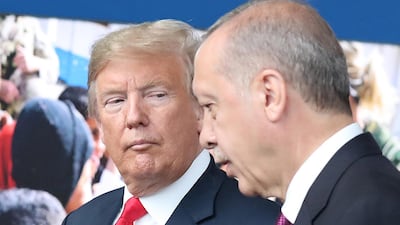This year’s Thanksgiving holiday in the United States was punctuated by an unprecedented war of words between President Donald Trump and Supreme Court Chief Justice John Roberts.
Mr Trump dismissed the federal judiciary as, in effect, partisan hacks. Mr Roberts fired back defending judicial integrity. The Republican heads of two of the three branches of US government were suddenly clashing.
But this was readily foreseeable. In these pages, I have been tracking Mr Trump's experiment in American de-institutionalisation, and specifically predicted it back on June 2.
Observing that the US president was systematically discrediting all sources of authority and veracity beyond his own direct control − beginning with the press, and moving on to Congress, the FBI and Justice Department, and the intelligence services – I wrote that “his probable next target is alarmingly obvious. An independent judiciary is an enormous obstacle and threat to any leader. The courts must be next…”
Mr Trump has never had any respect for courts. He repeatedly attacked Gonzalo Curiel, the judge presiding over the lawsuit against his "Trump University" over alleged fraudulent practices, as a hopelessly biased "Mexican", although he was born in Indiana.
And from the outset of his presidency, Mr Trump has been repeatedly thwarted by federal judges.
Several early versions of his Muslim "travel ban" were struck down by courts as unconstitutional, and Mr Trump responded by describing one of the key jurists as a "so-called judge".
He has repeatedly threatened to dissolve or purge the Ninth Circuit Court, which he particularly dislikes.
There have been numerous other instances in which courts have blocked his attempted policies.
In other cases, they have rescued Mr Trump from himself. One example is his deeply unpopular effort to strip people brought to the United States as children, who have since lived exemplary lives, of protections from deportation instituted by the Obama administration. He has been saved from the damaging impact of this order by courts that have repeatedly blocked it.
Another court may, however, be positioned to hoist Mr Trump with his own petard. His Justice Department and several state attorneys general have been suing to effectively overturn “Obamacare” health laws that are now very popular, especially since they protect Americans against denial of insurance because of “pre-existing conditions”.
In the recent midterm elections, for instance, Mr Trump preposterously claimed that Democrats would strip people of such protections while Republicans would preserve them, even as his own attorneys were trying to overthrow those very rules in the courts. Should Mr Trump prevail in the suit, public outrage would be colossal.
Either way, in this and several other encounters with the courts, he loses. That’s precisely the problem: he cannot control what the courts will or won’t do.
That is unacceptable for a leader seeking de-institutionalisation. The best example of this process succeeding is probably Turkish President Recep Tayyip Erdogan, whom Mr Trump greatly admires.
Mr Erdogan inherited a Turkish system with many institutions, no matter how fledgling or fragile they may have been. He has systematically dismantled them, particularly after the failed 2016 coup attempt, and replaced them with hollow institutional simulacra that, in reality, simply rubberstamp his own decisions.
Whether he fully realises it or not, that’s exactly the de-institutionalisation process Mr Trump is groping towards in the United States.
And he is going down the list of independent sources of authority and information with a relatively impressive precision, beginning with the media, which was low-hanging fruit, and only now directly attacking the courts and his other new target: senior military leaders, such as the widely respected retired Admiral William McRaven, architect of the killing of Osama bin Laden.
Unlike Republicans in Congress, however, Chief Justice Roberts appears to be strongly signalling to Mr Trump that even though he and a majority of Supreme Court colleagues − now including Brett Kavanaugh − may be committed Republicans, they have a keen sense of their institutional judicial prerogatives and are prepared to defend them against executive encroachment.
Mr Trump is likely to face some serious legal headaches in the coming months with the Robert Mueller investigation no longer restrained by a looming midterm election, and with Democrats poised to retake control of the House of Representatives’ committees and investigative authority in January.
Mr Mueller may attempt to subpoena the president. House Democrats may seek to subpoena his tax records. Many of his most controversial policies may also face serious legal challenge, and his conduct investigation and exposure.
He knows this, and his extreme anxiety is evident.
Obviously, the US judiciary is highly political and quite partisan. It is certainly clear that there are Republican and Democratic judges who often rule accordingly.
Chief Justice Roberts is implying that there is a limit to how compliant many Republican judges, especially on the Supreme Court, might be when the law clearly contradicts Mr Trump’s wishes.
Courts, however, have no enforcement power. They rely on the executive to respect their authority. Mr Trump is signalling he does not.
If they rule against him, and he does not accept their decisions, a historic constitutional crisis, which could decide the fate of Mr Trump’s de-institutionalisation project, will ensue.
Hussein Ibish is a senior resident scholar at the Arab Gulf States Institute in Washington


